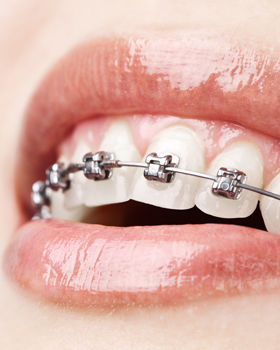Newington Dental
Teeth can become sensitive to hot and cold temperatures, or to spicy foods, for a few different reasons.
Thin Enamel – If the enamel around the tooth becomes thin the dentin inside the tooth, and the nerve inside the dentin, are left more exposed. This makes them very sensitive to the conditions in the mouth. Hot, cold or spicy food will directly effect the nerve, and the tooth will feel sharp pain.
Receding Gums – If the gums recede then the roots of the teeth will be left exposed. these roots have very little enamel to insulate them from the general conditions in mouth. so the nerve in the tooth feel pain when exposed to hot, cold or spicy foods.
Gums may recede because of gum disease. Gums also tend to recede at least a little with old age. Healthy gums which are diligently cleaned every day, suffer far less disease and are far less likely to recede.
Decayed teeth – If the tooth suffers decay, or suffers a crack, then the nerve may be exposed to the conditions in the mouth. So it will suffer pain when exposed to hot cold or spicy food and drinks. This type of damage also causes the tooth to feel pain when exposed to sugar.
Basically the tooth enamel helps insulate the inner dentin and nerve from hot and cold conditions. If the enamel is thin or broken the insulation is compromised, and the tooth becomes sensitive to pain.
We can avoid sensitive teeth by:
- Not brushing too soon after eating and drinking. Some foods and drinks soften the enamel. This is anything that is acidic. If we brush while the enamel is soft then we brush some of the enamel away. Over time this causes the enamel to become thin. wait 30 minutes before brushing.
- Drink plenty of water, especially after eating and drinking
- Not using a hard tooth bristle brush. Hard bristles wear the enamel away over time.
- Never using too much pressure when brushing. This also wears away enamel
- Avoid soft drinks, fruit juice, sugary food and anything acidic in the mouth.
- Regular brushing (twice daily) and mouth wash will prevent gum disease and decay, greatly reducing the occurrence of sensitive teeth.
- Chew sugar free gum, especially with Xylitol, to keep teeth clean.
- Fluoride on the teeth and calcium in the diet will help strengthen tooth enamel, preventing sensitivity.
- Do not use teeth whitening products, as these can make teeth more sensitive.
If the teeth are already sensitive then we can use a toothpaste and mouthwash design to reduce the pain. Look for Sensodyne or Colgate sensitive. These need to be used for a few week to be effective, but they steadily reduce the pain and sensitivity of teeth.
If the gum have reseeded then you will need treatment from a periodontist (gum and jawbone specialist) or dentist.
Dental Newington
Regular dental visits and diligent daily brushing will greatly reduce the risk of developing tooth sensitivity. Teeth that have already suffered damage can be effectively treated by the dentist.









